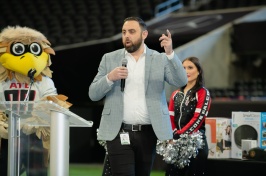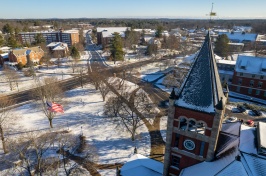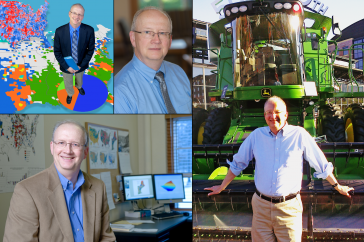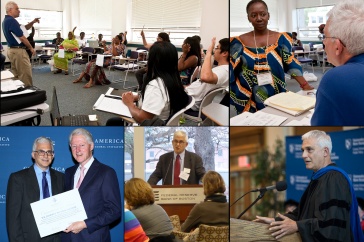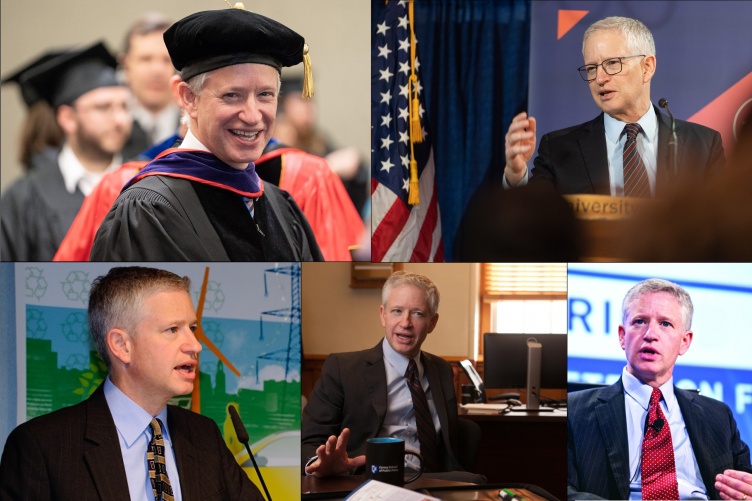
Michael Ettlinger is always thinking of the bigger picture.
“My undergraduate degree was in electrical engineering and then, well, then I went to law school,” he says, looking back. “In a way, it’s the ultimate engineering challenge, right? To figure out how society operates.”
Ettlinger has made a career by working on the answers to that question, and attempting to push public policy toward solutions. Today he is the Director of the Carsey School of Public Policy at UNH, where he not only has a voice in national policy discussions, but also helps to guide future policy experts and advocates. And while his position today may seem a far cry from the circuit boards of his youth, it wasn’t much of a stretch in Ettlinger’s mind.
“I was very interested in math and physics in high school, always tinkering around with circuits and computer architecture. So, I did those things, but I was also interested in the way the world worked.”
The son and grandson of electrical engineers, Ettlinger saw a track toward steady, engaging work if he followed in the family tradition. But as he completed his undergraduate studies at Cornell University, he found himself more and more pulled toward problems on a larger scale.
“How do you optimize society for everybody?”
Before college, Ettlinger grew up in a politically active family in Hastings-on-Hudson, New York, just 15 miles north of New York City. The small village had been a manufacturing hub for more than a century when Ettlinger was born, producing cut stone, pavement, cable, and industrial chemicals along the river shore. However, after decades of consolidation and layoffs, the Anaconda Wire and Cable Company shut down its Hastings-on-Hudson factory in 1975. The way the effects rippled out into the village stayed with Ettlinger as he chose his path in life.
“It closed when I was in high school. Seeing that impact on families, on the community, and the people is what got me interested in the economic side of [public policy.]”
Law school seemed like the best step toward a career in making a difference. As a student, Ettlinger ran the American University Washington College of Law’s chapter of the Equal Justice Foundation, and after completing his JD, he began work for the Vietnam Veterans of America. Both institutions allowed him to straddle the line between pursuing change via litigation and broader policy work.
“The idea of litigation is: you see something needs changing and there happens to be a legal thread you can pull on to move things in that direction. The change you make is defined by the legal framework you’re operating under. I was more interested in changing the framework.”
“The idea of litigation is: you see something needs changing and there happens to be a legal thread you can pull on to move things in that direction. The change you make is defined by the legal framework you’re operating under. I was more interested in changing the framework.”
After a few years at the VVA, Ettlinger settled on public policy and began a career working toward positive societal change. His first stop took him back to his home state of New York, directly to the halls of power. From 1987 to 1989, he served as counsel to a member of the New York State Assembly, doing research, helping to draft bills, and negotiating with lawmakers. From there, he moved back to Washington, D.C. and spent the next two decades at some of the most influential think-tanks in the country.
Ettlinger doubled down on his interest in economic justice and pursued change through advocating changes to the tax system. For more than ten years, he served as State Tax Policy Director and then as overall Tax Policy Director for Citizens for Tax Justice and the Institute of Taxation and Economic Policy, where he participated in most major debates about federal and state tax laws. Think-tanks such as ITEP conduct specialized research and deliver public results that then influence decisions by lawmakers across the country.
As Tax Policy Director, Ettlinger authored analyses and designed a tax model to inform policies that would promote economic growth for all. The tax model he designed was, at the time, one of the very few non-governmental U.S. models and the only one to comprehensively model state and local level taxes. While his work in this time focused on taxation and economics, Ettlinger believes his true specialty is being a jack-of-all-trades and bridging ideas between disciplines.
“I might surprise an economist about how much I know about economics or someone who's spent their career on clean energy about how much I know about clean energy or someone who works on immigration about how much I know about immigration. The experts know more than me, but what I bring to the table is knowing enough about all [the disciplines] to help weave them together and make interconnections between them,” he says, emphasizing the collaborative nature of politics. “There are a lot of issues that end up crossing disciplinary boundaries.”
After a stop working on campaign finance reform, Ettlinger moved to two of the country’s most prominent think-tanks: the Economic Policy Institute and the Center for American Progress. At EPI he directed a national network of research organizations to advance state economic policy. He also created a joint internship program with Howard University and the University of Texas Pan-American to promote diversity in public interest economic organizations. Then, from 2008 to 2013, he served as the head of the economics team at the Center for American Progress and helped shape the U.S.’s response to the financial crisis of 2008. The years of building relationships between experts, analyzing the economy in a holistic way, and learning from his coworkers laid the foundation for success on the national stage. At CAP, a multi-issue think-tank, there was the opportunity to focus on the intersection of the economy with issues such as clean energy and immigration.
“The Center for American Progress was where a lot of those threads came together…. I spent a lot more time on Capitol Hill with senior leadership, working with people in the administration and in other countries addressing the Great Recession.”
“There's lots of ways people make contributions to this world. I just think that public policy is the one realm where that's your job. Look at the challenges society faces and figure out how to address them. The vision of the school is to prepare students to hit the ground running in their careers and to have the tools they need to make a difference.”
Reflecting back, Ettlinger is grateful to have been a part of a team whose impact can still be seen today. Our conversation took place the day after the Senate passed the Inflation Reduction Act, which he believes echoes the work he was a part of at CAP.
“That bill is going to make big investments in clean energy infrastructure and healthcare… which are big economic issues!” he says. “Something I spent a lot of time on was the Recovery Act bill in 2009, which included significant healthcare and clean energy initiatives. In some ways, we were precursors to what’s happening now.”
He left CAP in 2013 and after a one-year stint at the Pew Charitable Trusts, Ettlinger joined Carsey as the school’s Founding Director. He now proudly uses his combination of big-picture thinking and policy expertise to guide future generations of lawmakers, advocates, and community workers. Whether or not society can truly be solved like an engineering problem is still up for debate, but Ettlinger makes a compelling case that diligent work in policy is the best way to do good on the societal level.
“There's lots of ways people make contributions to this world. I just think that public policy is the one realm where that's your job. Look at the challenges society faces and figure out how to address them,” he says with a hint of excitement in his voice. “The vision of the school is to prepare students to hit the ground running in their careers and to have the tools they need to make a difference.”
(Ettlinger has announced that he will be returning to policy and political work in Washington, D.C. His last day at UNH will be Jan. 31, 2023.)
Reported by Benjamin Scott Savard ‘23












